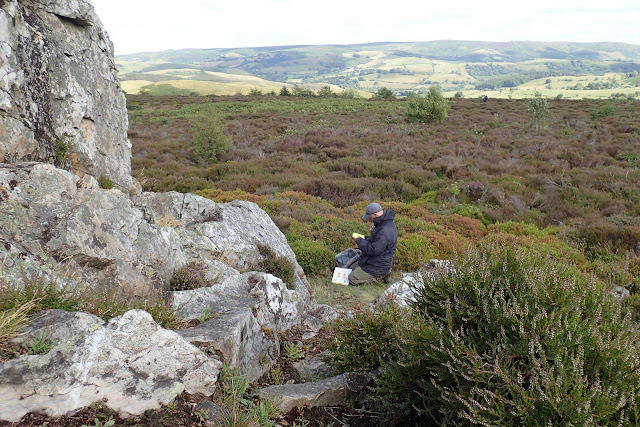
We parked at SO35629706 1/2 km south of Bog Mine that we had visited in the morning. Through the gate was a signpost up to Nipstones.
This is an outlier of the Stiperstones. This area had been planted with conifers in the 1960s, but now a project Back to purple had started returning it to heathland. We met a lady collecting bilberries with a bilberry comber.
This lichen covered post pointed up the hill
There was a lizard at the foot of this post.
 |
| And lichens on the post |
 |
We examined the lichens on the post.
Then set off up the slope to the Nipstone - in the next monad - SO35689699 |
The tor is made of quartzite and is 480 million years oldOn the vertical side of this tor we found a very dark Parmelia - it had very few white pseudocyphellae and was much flatter on the rock than is Parmelia omphalodes. It is Parmelia discordans. Is medulla does not turn red with bleach as does that of P omphalodes.
 |
| Parmelia discordans |
 |
| Parmelia discordans |
 |
| Parmelia discordans |
 |
| Parmelia omphalodes |
 |
Umbilicaria polyphylla
|
There was some yellow on the rock
 |
| We decided it was probably Xanthoria ucrainica |
 |
| In some shaded place near the foot of the crag was Lepraria membranacea It has a deifinite edge to the thallus |
 |
The summit of Nipstone Rock - with North East Shropshire beyond.
It was pretty windy at my height on the rock - never mind the top |
Xanthoparmelia mougetii
 |
| Xanthoparmelia mougetii |
 |
| Schaereria |
 |
| Schaereria |
 |
| Setting off back down |
 |
| See the Stiperstones beyond |
 |
| Bilberries |
Interesting that the only other places I have seen Parmelia discordans and Xanthoparmelia mougetii in England was at the same place - near the Stainmore Pass with Les and Sue Knight. (Seen them in Scotland also).
Will I go out tomorrow? I have collected so many specimens - if I don't sort them out and read about them they will be wasted. Perhaps it would be better to stay in the lab and sort them out...
See whether I go or not ...





























No comments:
Post a Comment